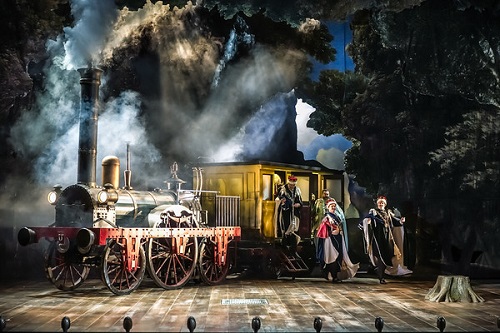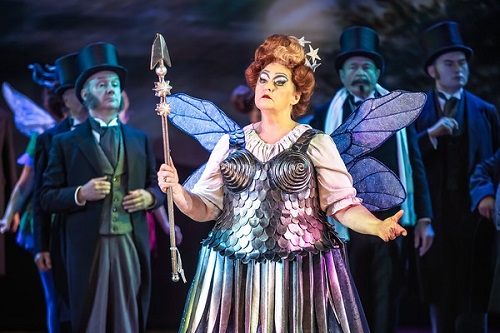The curtain lifts to reveal a land of fairies: trailing vines, enormous flowers, rainbow-tinted lights. As W.S. Gilbert writes later on, it all looks like something from ‘Andersen’s library’. This extravagantly colourful production of Iolanthe at the London Coliseum is a revival of the ENO’s 2018 production directed by Cal McCrystal. The standard of performance throughout is extremely high. Marcus Farnsworth charms with his Candide-smile as Strephon, the half-fairy Arcadian shepherd. Phyllis, his alternatingly sweet and distressed beloved, is played by the delightful Ellie Laugharne. They are dressed in Act I in a matching set of white covered with blue prints, looking for all the world like a pair of animated Victorian tea cups.
Iolanthe, played by Samantha Price, is ultimately responsible for the drama, but she does not dominate the actual stage. That responsibility rests with the Queen of the Fairies and The Lord Chancellor. Catherine Wyn-Rogers is perfectly cast as the former. Her flights across the stage, fanciful breastplate, and flame-throwing magic-wand wonderfully caricature a Wagnerian Valkyrie. The Lord Chancellor is played by John Savournin who, despite looking younger than one usually expects for this role, exudes both the vocal gravitas and physical authority that are required. Savournin followed his formidable performance of the ‘Nightmare Song’ with a topical insertion for ENO, claiming to have just had a nightmare that involves ‘relocating the House of Lords to the industrial North’.
Throughout, the ENO Chorus is clearly having a good time. Giggling fairies scurry hither and thither, taking turns flying above the stage, clad all the while in delightfully absurd costumes with sparkling wings. On Tuesday evening, the entrance of the Peers rightfully earned its own round of applause as an actual-size steam-engine burst through the backdrop. Both on the stage and in the orchestra, this is a lively, detailed, and energetic production.

Listeners will be – and were, as I found during the interval – divided by the extent of the gimmicks and running gags inserted throughout, of which there are many. There is nothing inherently wrong with adding gratuitous material, and some of it is undoubtedly funny. But there are moments in which the background of ENO’s production threatens to overtake its foreground.
In Act I, for example, Phyllis and Strephon reaffirm their love and their intent to wed in a simple duet (“Thou the tree and I the flower/Thou the idol; I the throng/Thou the day and I the hour/Thou the singer; I the song!”). This is a dramatically important number because the audience must believe the pair’s affection in order to feel invested in the outcome of their subsequent troubles. The duet was sung by Farnsworth and Laugharne with all of the tenderness for which one could ask. From a purely musical standpoint, it was lovely to listen to – or at least, it would have been had one’s attention not been chaotically divided. Farnsworth and Laugharne were placed lower stage left, out of the way, as it were. On the rest of the stage, and at times between the lovers, two ‘stagehands’ wandered about, dressed in full-body black tights. To no dramatic purpose, they set about arranging and then rearranging a flock of sheep mannequins and engaged in a series of gags: feigning blindness, bumping into each other, stumbling into the proscenium, fighting over a pink flamingo, and – the conclusion to which pastoral humour inevitably leads – fornicating with a sheep. The audience paid scant attention to our two lovers.
Another example is the Quartet in Act II with Lord Mountaratat, Earl Tolloller, Phyllis, and Private Willis, “Oh, many a man, in Friendship’s name”. Behind these singers – again, to no dramatic purpose – we were treated to a procession of cameos: a handsy nun with her priest, ‘Boris Johnson’ making one of several appearances, and again that hot-pink flamingo, this time riding a cow in front of Westminster. One almost forgot that the quartet was singing.
Cal McCrystal and Toby Davies co-wrote these gags, which they believe to be ‘strictly in the spirit of the piece, although a little saucier than would have been acceptable when the show first opened’. Iolanthe, McCrystal wrote in 2018, ‘deserves to be as fruity as we can possibly make it’. This is the mindset behind the gags. Thus, the Lord Chancellor’s Page tries, unsuccessfully, to slip his Lordship’s foot into a shoe. The Page innocently asks, ‘Have you got the horn?’, to which The Lord Chancellor winks, ‘No, it’s just the way I’m sitting’.
Again, there is a case to be made for the addition of material, especially when it is politically topical, which Iolanthe’s original production most certainly was. But one questions the prominence and sheer number of gimmicks: a unicorn whose horn doubles as a beer pump, a suggestively placed tape-measure over Strephon’s groin, the intentional mispronunciation of Strephon’s name throughout by the Queen of Fairies as ‘Strap on’, coaching the audience in part of Act II to sing along, a cocaine-sniffing ‘Michael Gove’, a defecating horse, the insertion during a scene-change of extracts from Mary Poppins’ ‘Step in Time’, etc., etc.

We have, of course, stepped into the world of pantomime. It should be noted that the role of The Lord Chancellor’s Page is spiritedly played by the actor Adam Brown, whom audiences may recognise as one of the dwarves in Peter Jackson’s The Hobbit. Brown co-writes pantomimes for the Salisbury Playhouse and the Corn Exchange, and he has clearly been contracted on this occasion for his expertise in that medium. His goofy, wide-eyed Page is a cross between Mr. Bean and Baldrick, darting to and fro, bouncing on sofas, falling over, intruding upon stage at the wrong moment, and so on. In the trio between The Lord Chancellor, Lord Mountararat, and Earl Tolloller (“If you go in/You’re sure to win”), Brown transforms the Page into a silent fourth partner who nevertheless manages to be the loudest presence on stage.
For every addition made, something in the original gives ground, and it is usually the musical content. To understand the difference, one has only to consider the single scene in ENO’s production to which no gimmick is added. This is the Ballad of Act II (‘He loves’), in which Iolanthe begs The Lord Chancellor to allow her (their) son to marry. Clad in fairy green, Iolanthe kneels in supplication, eyes towards heaven, imploring The Lord Chancellor to recall the love he himself once felt in bygone years, “For one untimely dead”. (“If, in the eventide of life,/Sad thoughts of her arise,/Then let the memory of thy wife/Plead for my boy – he dies!”). This is beautiful text set to beautiful music. No additions are needed. It is also a poignant example of how all comedy, even pantomime, requires moments of repose to balance and intensify its farcical side. Samantha Price as Iolanthe was magnificent, her warm placatory tone drawing all of our attention, with the subtle, unsettled shifting of The Lord Chancellor on his throne in the dimly lit background as he listened. We listened, too. The theatre suddenly breathed to be so free from distraction. It was the highpoint of the evening.
Despite my own reservations, I left the Coliseum thinking, as is always the case with Gilbert and Sullivan, that I would not mind seeing it again.
Eric McElroy
Iolanthe – Samantha Price, The Lord Chancellor – John Savournin, Queen of the Fairies – Catherine Wyn-Rogers, Phyllis – Ellie Laugharne, Strephon – Marcus Farnsworth, Earl Tolloller – Ruairi Bowen, Mountararat – Ben McAteer, Celia – Llio Evans, Leila – Bethan Langford, Fleta – Petra Massey, Private Willis – Keel Watson, The Page – Adam Brown, Captain Shaw – Clive Mantle; Director – Cal McCrystal, Conductor – Chris Hopkins, Set and Costume Design – Paul Brown, Lighting Design – Tim Mitchell, Revival Lighting Design – Ian Jackson-French, Choreographer – Lizzi Gee, Sound Design – Dominic Bilkey, Chorus of English National Opera (Martin Fitzpatrick, Chorus Director), Orchestra of English National Opera.
English National Opera, London Coliseum; Tuesday 10th October 2023.
ABOVE: The cast of ENO’s Iolanthe © Craig Fuller